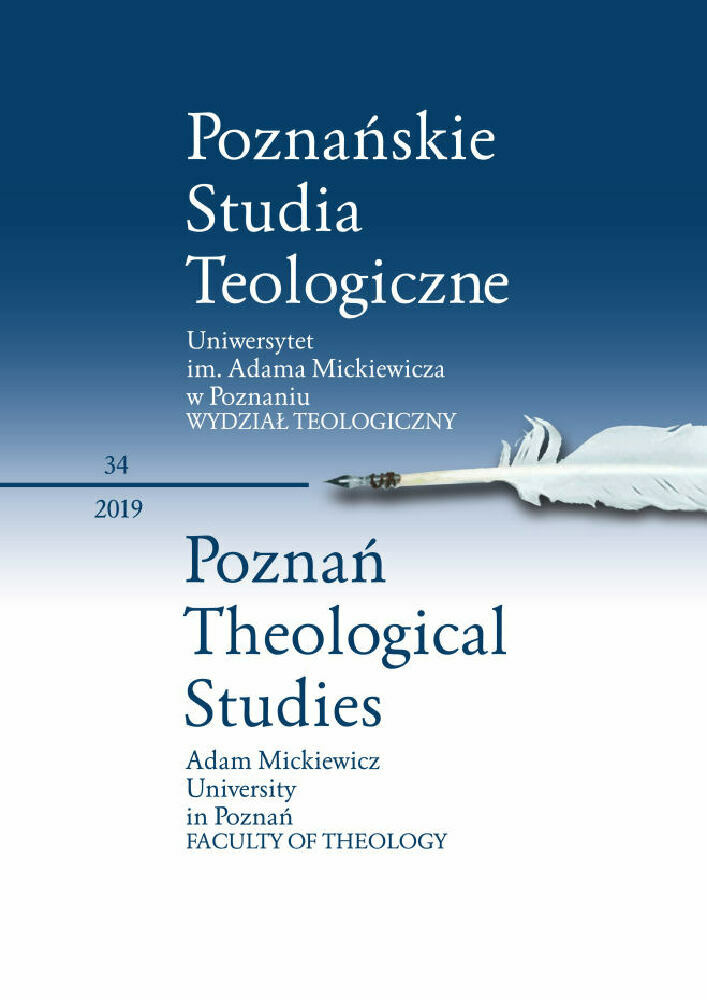Abstrakt
Faith is not man’s own project, but his adequate response to Revelation, the personal self-giving of God in history. Because the initiative of Revelation is an absolute condition for the possibility of faith, it gives faith a concrete shape — the specific features of Revelation shape the way faith is formed. The first feature of Revelation is the fact that the Word of God spoke in the human word, that is why faith is not a direct view of the Divine, but it is carried out by reception of what is immanent. The next feature of Revelation is the dialectic of the self-revealing and self-veiling of God. Faith in a natural way is thus stirred with questions, it cannot be manipulated and possessed. The third feature of Revelation, the one that most affects the specific shape of faith, is the fact that it was ultimately accomplished by the Divine Person of the Logos who accepted human nature. Historically becoming the person of Jesus Christ, who is the “universale concretum”, and living in a specific time and space, he embodies in himself the ultimate saving will of God for every human being. The bond with the saving God is accomplished through a bond with Jesus Christ, present today in his Body, which is the Church.
Bibliografia
Augustyn św., Wyznania, tłum. Z. Kubiak, Kraków 2018.
Barth K., Der Römerbrief, Zürich 1978.
Deklaracja przystąpienia do Rodzimego Kościoła Polskiego, https://rkp.org.pl/deklaracja, [dostęp 24.07.2018].
Franciszek, encyklika Lumen fidei, 2013.
Gethmann C.F., Erkennen. I. Philosophisch [w:] LThK3, Bd. 3, s. 770–775.
Giussani L., Chrześcijaństwo jako wyzwanie. U źródeł chrześcijańskiego roszczenia, tłum. D. Chodyniecki, Poznań 2002.
Giussani L., Zmysł religijny, tłum. K. Borowczyk, Poznań 2000.
Górnisiewicz A., Nowoczesność, nihilizm, polityka. Wokół myśli Karla Löwitha, Kęty 2014.
Heidegger M., Die onto-theo-logische Verfassung der Metaphysik [w:] tenże, Identität und Differenz, Heidegger Gesamtausgabe, Bd. 11, hrsg. v. F.W. von Herrmann, Frankfurt a. M. 2006.
Ireneusz z Lyonu św., Adversus Haereses, tłum. J. Brylowski, Pelplin 2018.
Katechizm Kościoła Katolickiego, Poznań 2012.
Koniński K.L., Uwagi 1940–1942, Poznań 1987.
Krąpiec M., Stryjecki J., Forma i materia [w:] Encyklopedia katolicka, t. V, Lublin 1989, s. 392–394.
Kulenkampff A., Erkennen [w:] Handbuch philosophischer Grundbegriffe, hrsg. v. H. Krings, H.M. Baumgartner, Ch. Wild, München 1973, Bd. 2, s. 397–408.
Langevin G., Fede [w:] Dizionario della teologia fondamentale, a cura di R. Latourelle, R. Fisichella, Assisi 1990, s. 427–434.
Lehmann K., Glaube [w:] Handbuch philosophischer Grundbegriffe, hrsg. v. H. Krings, H.M. Baumgartner, Ch. Wild, München 1973, Bd. 3, s. 596–605.
Löser W., „Universale concretum” als Grundgesetz der oeconomia revelationis [w:] Handbuch der Fundamentaltheologie, hrsg. v. W. Kern, H.J. Pottmeyer, M. Seckler, Tübingen–Basel 2000, Bd. 2: Traktat Offenbarung, s. 83–93.
Löwith K., Historia powszechna i dzieje zbawienia. Teologiczne przesłanki filozofii dziejów, tłum. J. Marzęcki, Kęty 2002.
Lubac H. de, Medytacje o Kościele, tłum. I. Białkowska-Cichoń, Kraków 1997.
Margul T., Ostatnie koleje losu wiary starorzymskiej, „Annales Universitatis Mariae Curie-Skłodowska. Sectio F, Nauki Filozoficzne i Humanistyczne” 25 (1970), s. 1–25.
Matka Teresa, „Pójdź, bądź moim światłem”. Prywatne pisma „Świętej z Kalkuty”, tłum. M. Habura, red. B. Kolodiejchuk, Kraków 2008.
Müller G.L., Katholische Dogmatik. Für Studium und Praxis der Theologie, Freiburg 2007.
Novak M., Boga nikt nigdy nie widział. Noc ciemna ateistów i wierzących, tłum. M. Pasicka, Kraków 2010.
Peterson E., Was ist Theologie? [w:] Theologische Traktate, hrsg. v. B. Nichtweiss, Würzburg 1994, s. 1–22.
Ratzinger J., Wiara, prawda, tolerancja. Chrześcijaństwo a religie świata, tłum. R. Zajączkowski, Kielce 2005.
Ratzinger J., Wprowadzenie w chrześcijaństwo, tłum. Z. Włodkowa, Kraków 1970. Schaeffler R., Die Kritik der Religion [w:] Handbuch der Fundamentaltheologie, hrsg. v. W. Kern, H.J. Pottmeyer, M. Seckler, Tübingen–Basel 2000, Bd. 1: Traktat Religion, s. 85–99.
Schmaus M., Wiara Kościoła. Objawienie — inicjatywa Boża oczekująca odpowiedzi człowieka: wiary, t. I: Dogmatyka podręczna, tłum. J. Zaremba, Gdańsk-Oliwa 1989.
Schmitz J., Das Christentum als Offenbarungsreligion im kirchlichen Bekenntnis [w:] Handbuch der Fundamentaltheologie, hrsg. v. W. Kern, H.J. Pottmeyer, M. Seckler, Tübingen–Basel 2000, Bd. 2: Traktat Offenbarung, s. 1–12.
Seckler M., Der Begriff der Offenbarung [w:] Handbuch der Fundamentaltheologie, hrsg. v. W. Kern, H.J. Pottmeyer, M. Seckler, Tübingen–Basel 2000, Bd. 2: Traktat Offenbarung, s. 41–61.
Seckler M., Glaube. IV. Systematisch-theologisch und theologiegeschichtlich [w:] LThK3, Bd. 4, s. 672–685.
Sobór Watykański I, Konstytucja dogmatyczna o wierze katolickiej Dei Filius. Sobór Watykański II, Deklaracja o wolności religijnej Dignitatis humanae.
Sobór Watykański II, Konstytucja dogmatyczna o Kościele Lumen gentium.
Sobór Watykański II, Konstytucja dogmatyczna o Objawieniu Bożym Dei Verbum. Walter P., Ursakrament [w:] LThK3, Bd. 10, s. 481–482.
Welte B., Filozofia religii, tłum. G. Sowinski, Kraków 1996.
Welte B., Czym jest wiara? Rozważania o filozofii religii, tłum. W. Patyna, Warszawa 2000.
Licencja
© 2019 Uniwersytet im. Adama Mickiewicza w Poznaniu, Wydawnictwo Naukowe UAM, Poznań
OPEN ACCESS

